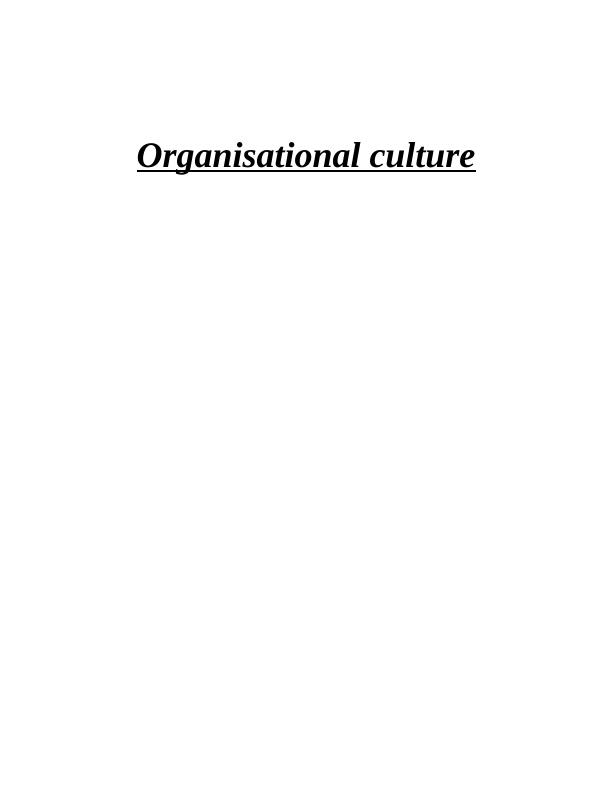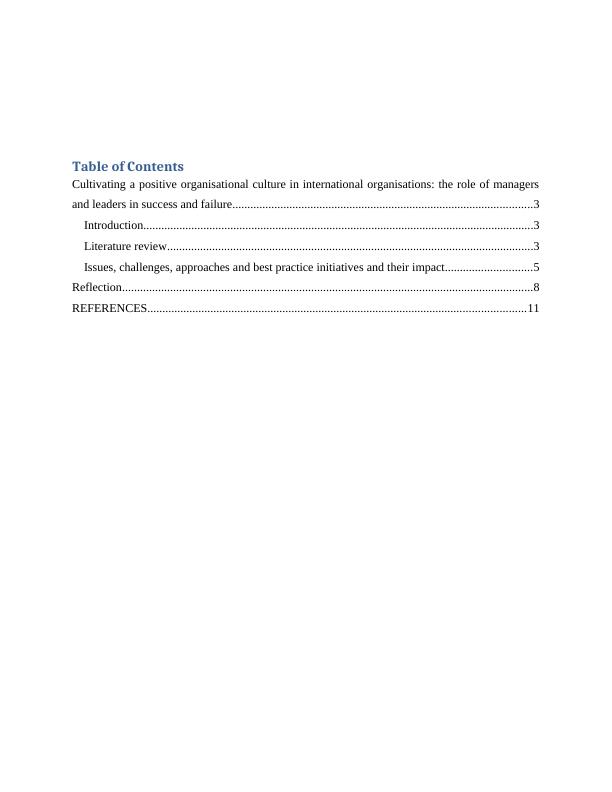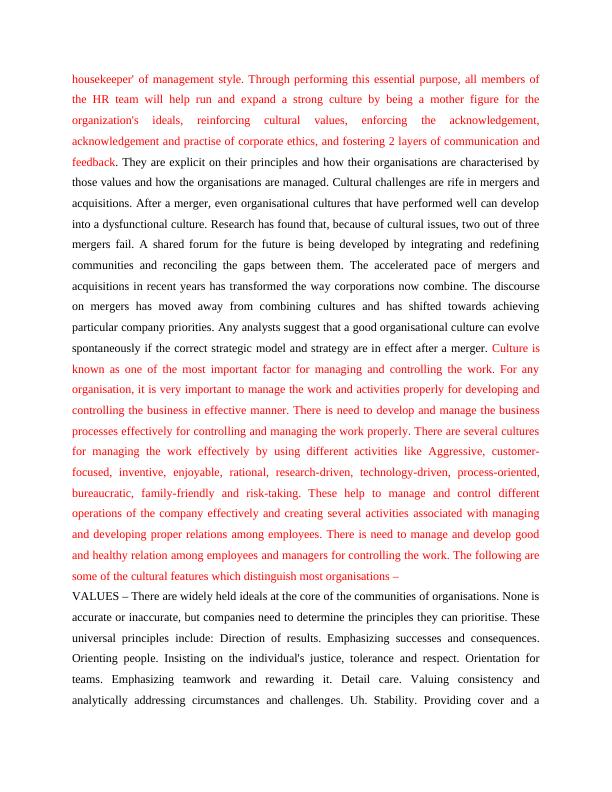Cultivating a Positive Organisational Culture in International Organisations
Added on 2023-01-05
12 Pages3814 Words231 Views
Organisational culture

Table of Contents
Cultivating a positive organisational culture in international organisations: the role of managers
and leaders in success and failure....................................................................................................3
Introduction..................................................................................................................................3
Literature review..........................................................................................................................3
Issues, challenges, approaches and best practice initiatives and their impact.............................5
Reflection.........................................................................................................................................8
REFERENCES..............................................................................................................................11
Cultivating a positive organisational culture in international organisations: the role of managers
and leaders in success and failure....................................................................................................3
Introduction..................................................................................................................................3
Literature review..........................................................................................................................3
Issues, challenges, approaches and best practice initiatives and their impact.............................5
Reflection.........................................................................................................................................8
REFERENCES..............................................................................................................................11

Cultivating a positive organisational culture in international organisations:
the role of managers and leaders in success and failure
Introduction
There is need for companies to manage a positive culture for sharing beliefs and strategy. There
is need to manage and develop strong organisational culture for managing organisational value
and culture. An organisational culture is defined as proper way for behaving within the
organisation. There is culture which consists of shared belief as well as values which is
established by leaders for communicating and reinforcing various methods. There is need to
manage and develop effective strategies that lead to manage organisational context. It is seen that
there is need to manage the organisations which are effectively managing the consumption of
organisational culture. It is concluded that there is need to effectively manage and develop the
beliefs and culture followed by organisations for managing the work. There is need to develop
and manage the effectiveness of company’s values and beliefs for managing the functioning of
business. The HR department of a company manages to build new ways of enhancing the values
and beliefs within employees. It leads to effective management of company management and
functions. There is need to manage the HR department services for enhancing the way of
business operations. There is need to evaluate and conclude different aspects of business
effectively.
Literature review
It is concluded from the viewpoint of Ab Rahman and Jantan, ( 2020), A good culture is a
common denominator for the most profitable businesses. All share consensus on organisational
goals at the centre, and those principles concentrate not on people, but on the organisation and its
aims. Leaders in successful companies live their cultures every day and go out of their way to
communicate their cultural identities to employees as well as prospective new hires. HR
executives are accountable for maintaining that different age is a core focus in their
organizational marketing operations. In order for HR leaders to shape the community, they
should work with senior executives to decide what the organisational culture should look like.
Strategic planning and policy must step past only meeting organisational goals to reflect more
intensely on a startup's most valuable asset, the workers. HR has been described as the'
the role of managers and leaders in success and failure
Introduction
There is need for companies to manage a positive culture for sharing beliefs and strategy. There
is need to manage and develop strong organisational culture for managing organisational value
and culture. An organisational culture is defined as proper way for behaving within the
organisation. There is culture which consists of shared belief as well as values which is
established by leaders for communicating and reinforcing various methods. There is need to
manage and develop effective strategies that lead to manage organisational context. It is seen that
there is need to manage the organisations which are effectively managing the consumption of
organisational culture. It is concluded that there is need to effectively manage and develop the
beliefs and culture followed by organisations for managing the work. There is need to develop
and manage the effectiveness of company’s values and beliefs for managing the functioning of
business. The HR department of a company manages to build new ways of enhancing the values
and beliefs within employees. It leads to effective management of company management and
functions. There is need to manage the HR department services for enhancing the way of
business operations. There is need to evaluate and conclude different aspects of business
effectively.
Literature review
It is concluded from the viewpoint of Ab Rahman and Jantan, ( 2020), A good culture is a
common denominator for the most profitable businesses. All share consensus on organisational
goals at the centre, and those principles concentrate not on people, but on the organisation and its
aims. Leaders in successful companies live their cultures every day and go out of their way to
communicate their cultural identities to employees as well as prospective new hires. HR
executives are accountable for maintaining that different age is a core focus in their
organizational marketing operations. In order for HR leaders to shape the community, they
should work with senior executives to decide what the organisational culture should look like.
Strategic planning and policy must step past only meeting organisational goals to reflect more
intensely on a startup's most valuable asset, the workers. HR has been described as the'

housekeeper' of management style. Through performing this essential purpose, all members of
the HR team will help run and expand a strong culture by being a mother figure for the
organization's ideals, reinforcing cultural values, enforcing the acknowledgement,
acknowledgement and practise of corporate ethics, and fostering 2 layers of communication and
feedback. They are explicit on their principles and how their organisations are characterised by
those values and how the organisations are managed. Cultural challenges are rife in mergers and
acquisitions. After a merger, even organisational cultures that have performed well can develop
into a dysfunctional culture. Research has found that, because of cultural issues, two out of three
mergers fail. A shared forum for the future is being developed by integrating and redefining
communities and reconciling the gaps between them. The accelerated pace of mergers and
acquisitions in recent years has transformed the way corporations now combine. The discourse
on mergers has moved away from combining cultures and has shifted towards achieving
particular company priorities. Any analysts suggest that a good organisational culture can evolve
spontaneously if the correct strategic model and strategy are in effect after a merger. Culture is
known as one of the most important factor for managing and controlling the work. For any
organisation, it is very important to manage the work and activities properly for developing and
controlling the business in effective manner. There is need to develop and manage the business
processes effectively for controlling and managing the work properly. There are several cultures
for managing the work effectively by using different activities like Aggressive, customer-
focused, inventive, enjoyable, rational, research-driven, technology-driven, process-oriented,
bureaucratic, family-friendly and risk-taking. These help to manage and control different
operations of the company effectively and creating several activities associated with managing
and developing proper relations among employees. There is need to manage and develop good
and healthy relation among employees and managers for controlling the work. The following are
some of the cultural features which distinguish most organisations –
VALUES – There are widely held ideals at the core of the communities of organisations. None is
accurate or inaccurate, but companies need to determine the principles they can prioritise. These
universal principles include: Direction of results. Emphasizing successes and consequences.
Orienting people. Insisting on the individual's justice, tolerance and respect. Orientation for
teams. Emphasizing teamwork and rewarding it. Detail care. Valuing consistency and
analytically addressing circumstances and challenges. Uh. Stability. Providing cover and a
the HR team will help run and expand a strong culture by being a mother figure for the
organization's ideals, reinforcing cultural values, enforcing the acknowledgement,
acknowledgement and practise of corporate ethics, and fostering 2 layers of communication and
feedback. They are explicit on their principles and how their organisations are characterised by
those values and how the organisations are managed. Cultural challenges are rife in mergers and
acquisitions. After a merger, even organisational cultures that have performed well can develop
into a dysfunctional culture. Research has found that, because of cultural issues, two out of three
mergers fail. A shared forum for the future is being developed by integrating and redefining
communities and reconciling the gaps between them. The accelerated pace of mergers and
acquisitions in recent years has transformed the way corporations now combine. The discourse
on mergers has moved away from combining cultures and has shifted towards achieving
particular company priorities. Any analysts suggest that a good organisational culture can evolve
spontaneously if the correct strategic model and strategy are in effect after a merger. Culture is
known as one of the most important factor for managing and controlling the work. For any
organisation, it is very important to manage the work and activities properly for developing and
controlling the business in effective manner. There is need to develop and manage the business
processes effectively for controlling and managing the work properly. There are several cultures
for managing the work effectively by using different activities like Aggressive, customer-
focused, inventive, enjoyable, rational, research-driven, technology-driven, process-oriented,
bureaucratic, family-friendly and risk-taking. These help to manage and control different
operations of the company effectively and creating several activities associated with managing
and developing proper relations among employees. There is need to manage and develop good
and healthy relation among employees and managers for controlling the work. The following are
some of the cultural features which distinguish most organisations –
VALUES – There are widely held ideals at the core of the communities of organisations. None is
accurate or inaccurate, but companies need to determine the principles they can prioritise. These
universal principles include: Direction of results. Emphasizing successes and consequences.
Orienting people. Insisting on the individual's justice, tolerance and respect. Orientation for
teams. Emphasizing teamwork and rewarding it. Detail care. Valuing consistency and
analytically addressing circumstances and challenges. Uh. Stability. Providing cover and a

End of preview
Want to access all the pages? Upload your documents or become a member.
Related Documents
Human Resource Management as an Integral Part of Organisational Culturelg...
|22
|6564
|462
HRM&D in a Global Contextlg...
|12
|4003
|72
Organisation Design and Management: Aspects of Organisational Culture in Contemporary Firmslg...
|9
|2972
|458
Developing Corporate Culturelg...
|18
|6090
|184
BUS 603 - Human Resource Management - Assignmentlg...
|7
|952
|53
Organisational Behaviour: Culture, Communication, and Motivationlg...
|13
|3229
|93
